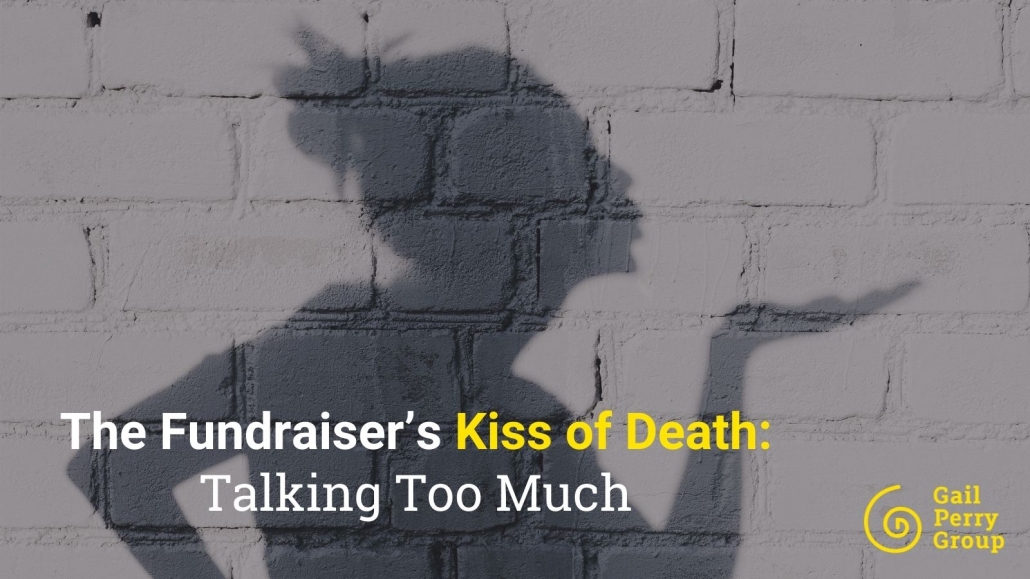
Over and over, we all fight the same battle: how to control our talking when we are meeting with a donor. After all, talking too much is the kiss of death.
It’s a challenge for everyone – newbies, experienced fundraisers, executive directors, board members, academic leaders alike.
So, let’s review why it’s so important to listen to the donor, rather than to make a presentation. Why do we want the donor to do most of the talking? Why is talking too much the kiss of death in fundraising?
You will turn your donor off.
Guess what – in a meeting, your donor is probably expecting to do most of the talking. She has opinions, she’s been thinking a lot about your organization, and she wants to express her point of view. She’s expecting to be heard, and she is not expecting to be presented to by you.
Above all, you want your donor to stay interested and involved in the conversation. If you are talking and talking, she may start taking mental side trips. Her eyes may start to glaze over. And then, the worst thing can happen – she may feel bored.
If that happens, she just might not want to see you again. Who wants to visit with someone who talks and talks all the time?
Put yourself in your donor’s shoes.
How long has it been since you felt stuck in a meeting with someone you could not escape from? And you were longing for a way out?
You certainly don’t want your donor to feel like she’s desperate to get away from you. Not at all; you want her to enjoy the visit and want to see you again.
You may think you’re being interesting, but your donor may think that you are droning on and on.
Are you guilty of the kiss of death – the “talking problem?”
Too many nonprofit leaders – CEO’s, development directors and board volunteers alike – are guilty of the “talking problem.”
Everyone thinks they need a presentation that can sell the donor on their cause. Even more, too many people think they need a sales pitch.
Here’s the truth.
You don’t need a pitch. You need to listen to your donor instead.
Why are listening skills more important than presentation skills?
Because in fundraising, we have to follow our donor’s lead. When meeting with a donor, we cater to them. Always, we try to bring the donor out and make them feel comfortable. It’s far more important to listen than it is to talk.
As major gift fundraisers, we pay very close attention to what is on our donor’s mind, so that we can find out where she stands. If we want to develop her interest, then we have to know where her strongest interests are.
If we truly want a warm relationship, then we need to know what is important to her. What her values are, and WHY she is so interested in our cause.
If we have this information, we can probably engage her deeply, get her involved, create a happy long term relationship and develop some wonderfully generous gifts.
Without this information about your donor, you are pretty much at a dead end. There is no cultivation pathway, and no way to plan an appropriate ask.
Our recommendation is that you and your team should never do more than 50% of the talking. You’ll find that you can become quite comfortable, simply sitting there, holding the space for your donor to share her thoughts. You can relax, watch, gauge and listen.
We think that self-awareness, self-control and a light touch should be very highly prized skills for major gift fundraisers.
Bottom line. Make this your fundraising motto: “Listen Your Way to the Gift.”
The donor will show you the way.
As always, it is a pleasure to share our weekly news and insights with you.
If your organization is planning a capital campaign or launching a major gifts program – we can help. Send an email to coaching@gailperry.com if you’d like to schedule a free strategy call with us.
